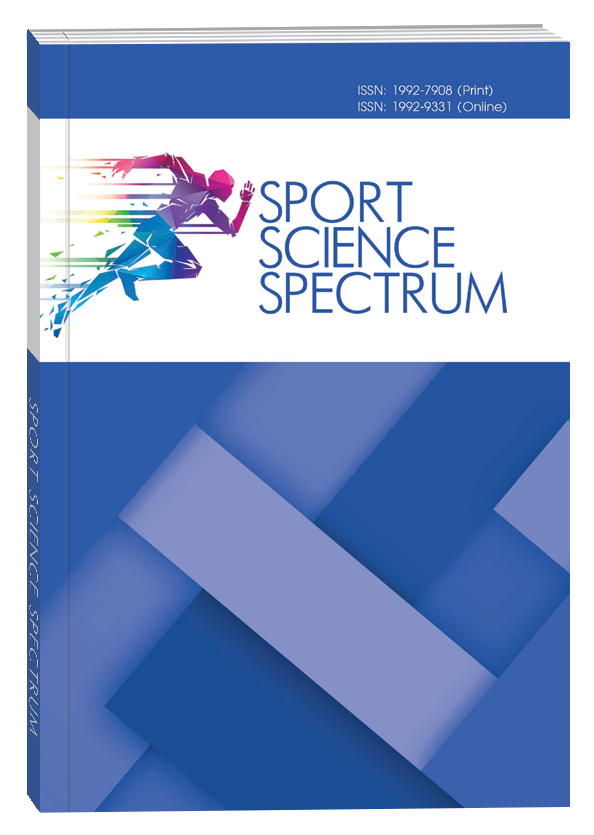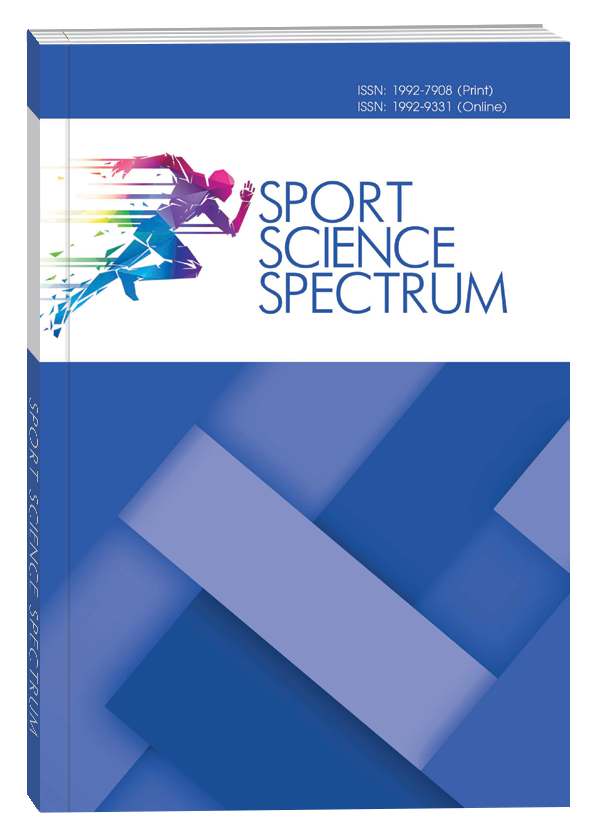THE IMPACT OF TECHNICAL AND TACTICAL TRAINING IN TENNIS ON THE DEVELOPMENT OF COGNITIVE AND PSYCHOLOGICAL SKILLS
DOI:
https://doi.org/10.32782/spectrum/2024-4-5Keywords:
technical and tactical training, tennis, cognitive skills, psychological trainingAbstract
The article examines the impact of the technical and tactical training program on the development of technical, cognitive and psychological skills of young tennis players. The relevance of the study is due to the need to integrate integrated approaches covering not only physical, but also cognitive and psychological training of athletes to increase their performance and resistance to stress. In modern sports, special attention is paid to training methods that contribute to the development of strategic thinking, emotional stability and the ability to make quick decisions, because these factors significantly affect the success of athletes’ performances in competitions. The aim of the work is to study the impact of technical and tactical training on the development of cognitive and psychological skills of tennis players, in particular on their ability to make quick decisions, concentration, emotional self-regulation and resistance to stress. Research methods: testing technical, tactical, cognitive, and psychological indicators, applying descriptive mathematical statistics using IBM SPSS 23 and the paired t-test to verify the statistical significance of changes. Results. A significant improvement in all indicators of tennis players of the experimental group was shown. Technical skills, such as serving and hitting accuracy, increased by an average of 12–15%. Cognitive performance, including attention span and working memory, improved by 15–20%, confirming an increase in cognitive flexibility. Psychological indicators, such as the perception of stress, decreased by 22%, indicating a significant improvement in emotional resilience and the ability to self-regulate.Conclusions. The effectiveness of a comprehensive program covering technical, tactical and cognitive components in the development of sports and psychological characteristics of tennis players has been confirmed. This emphasizes the importance of introducing such techniques into the training process to improve the overall performance of athletes and their psychological readiness for competition.
References
1. Євтифієв А., Бочкарев С., Євтифієва І., Донець Ю., Недбайло І., Натарова В. Кореляційний аналіз психофізіологічних показників борців вільного стилю як фактор успішності змагальної діяльності. Науковий часопис Національного педагогічного університету імені М.П. Драгоманова. Серія 15 «Науково-педагогічні проблеми фізичної культури (фізична культура і спорт)» : збірник наукових праць / за ред. О. Тимошенка. Київ, 2023. Вип. 7 (167) 23. С. 84–88. URL: https://spppc.com.ua/index.php/journal/issue/view/69/7-2023-pdf.
2. Євтифієв А., Бочкарев С., Поляков І., Євтифієва І., Хірний С., Недбайло І. Методика підготовки борців вільного стилю з урахуванням індивідуальних особливостей психіки. Науковий часопис Національного педагогічного університету імені М.П. Драгоманова. Серія 15 «Науково-педагогічні проблеми фізичної культури (фізична культура і спорт)». 2023. Вип. 3 (161) 23. С. 79–83. URL: https://doi.org/10.31392/NPU-nc.series15.2023.03(161).18.
3. Євтифієва І., Донець Ю., Недбайло І., Хірний С., Бороган В. Аналіз взаємозв’язку активності матчу й фізіологічної реакції тенісисток в одиночному розряді. Олімпійський та паралімпійський спорт. Сумський державний педагогічний університет імені А.С. Макаренка. 2024. № 1. С. 66–70. URL: https://journals.spu.sumy.ua/index.php/sport/article/view/255.
4. Євтифієва І., Донець Ю., Недбайло І., Журбін М. Вплив фізичної підготовленості на вибір індивідуального стилю гри у теніс. Науковий часопис Українського державного університету імені Михайла Драгоманова. Серія 15 «Науково-педагогічні проблеми фізичної культури (фізична культура і спорт)» : збірник наукових праць / за ред. О. Тимошенка. Київ, 2024. Вип. 1 (173) 24. C. 60–64. URL: https://spppc.com.ua/index.php/journal/article/view/1631/1604.
5. Anderson J., Carter R. Cognitive and tactical training in tennis: Impact on mental health and decision-making. Journal of Sports Psychology. 2020. № 45 (3). P. 223–237. URL: https://doi.org/10.1016/j.jpsyc.2020.04.006.
6. Brown P., Green T. Mental health and cognitive flexibility in athletes: The role of tactical training. International Journal of Sports Psychology. 2019. № 44 (3). P. 135–147. URL: https://doi.org/10.1037/sps.2019.0074.
7. Evans M. Mental resilience in tennis players: A tactical approach. International. Journal of Sports Science. 2022. № 55 (4). P. 112–120. URL: https://doi.org/10.1037/sps.2022.0047.
8. Fonseca Morales A., Martínez-Gallego R. Teaching tactics in tennis. A constraint-based approach proposal. ITF Coaching & Sport Science Review. 2021. № 29 (84). P. 6–8. URL: https://doi.org/10.52383/itfcoaching.v29i84.198.
9. Huang W., Lu M., Zeng Y. et al. Technical and tactical diagnosis model of table tennis matches based on BP neural network. BMC Sports Sci Med Rehabil. 2021. № 13. P. 54. URL: https://doi.org/10.1186/s13102-021-00283-3.
10. International Tennis Federation (ITF). The role of tactical training in enhancing emotional resilience and stress management in tennis. ITF Research Report on Tennis Development. 2021. № 22 (1). P. 25–38. URL: https://www.itf.com/tactical-training-stress.
11. Sun J., Du X. Research on Table Tennis Techniques and Tactics Based on Algorithmic Analysis of Gaze Big Data. HBDSS 2022 : 2nd International Con- ference on Health Big Data and Smart Sports, Xiamen, China, 2022. P. 1–5.
12. J. Wu, D. Liu, Z. Guo, Q. Xu, Y. Wu. TacticFlow: Visual Analytics of Ever-Changing Tactics in Racket Sports. IEEE Transactions on Visualization and Computer Graphics. Jan. 2022. Vol. 28. № 1. P. 835–845. DOI: 10.1109/TVCG.2021.3114832.
13. Kozina Zh., Yevtyfiieva I., Muszkieta R., Prusik Kr., Podstawski R. General and individual factor structure of complex preparation of young tennis players of 10–12 years. Journal of Physical Education and Sport. № 20 (2). P. 1242–1249. URL: https://efsupit.ro/images/stories/april2020/Art%20173.pdf.
14. Martinez A., Li J. Stress management in high-performance tennis: A strategic framework. Sports Performance Review. 2019. № 29 (2). P. 88–102. URL: https://doi.org/10.1007/spr.2019.0067.
15. Platonov V. The system of training athletes in Olympic sports. General theory and its practical applications. Olympic literature. 2015. № 1. P. 680.
16. Raschke A., Lames M. Video-based tactic training in tennis. Ger J Exerc Sport Res. 2019. № 49. P. 345–350. URL: https://doi.org/10.1007/s12662-019-00598-x.
17. Smith J. The impact of tactical training on decision-making and mental resilience in tennis players. Journal of Sports Science and Performance. 2020. № 34 (2). P. 112–125. URL: https://doi.org/10.1016/j.jssp.2020.02.001.
18. Suprunenko M. Biomechanical substantiation of motor and punch action formation in tennis by taking into account the formation of promising skills and abilities. Journal of Physical Education and Sport. 2021. № 21 (1). P. 367–373. URL: https://ouci.dntb.gov.ua/en/works/lRwEaWM9/.
19. United Nations. Transforming our world: The 2030 Agenda for Sustainable Development. United Nations Publication. 2015. URL: https://www.un.org/sustainabledevelopment/development-agenda.
20. Yevtyfiieva I., Borysova O., Boreiko N. Determination of the style of play of young tennis players taking into account individual characteristics. Rehabil- itation and Recreation. 2024. № 18 (2). P. 158–173. URL: https://doi.org/10.32782/2522-1795.2024.18.2.16.
21. Yevtyfiieva I., Korobeinik V., Kolisnychenko A. The influence of training loads of technical and tactical training on the cardiovascular system of tennis players 10–12 years. Health, Sport, Rehabilitation, 2019. № 5 (4). P. 23–32. URL: https://doi.org/10.34142/HSR.2019.05.04.03.





